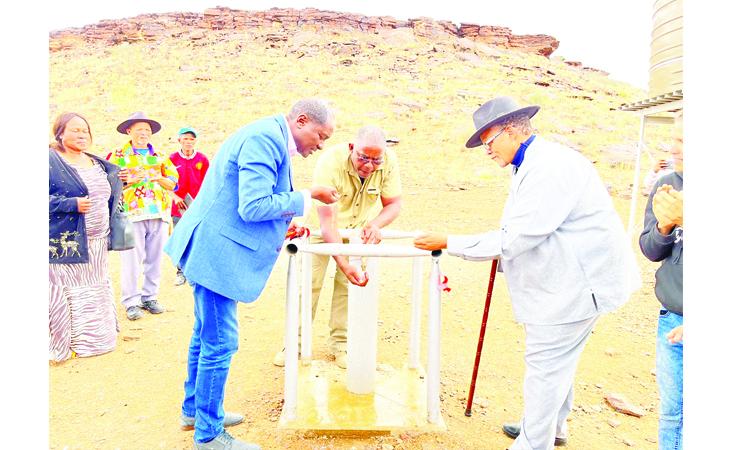Africa-Press – Namibia. MINISTER of environment, forestry and tourism Pohamba Shifeta says persistent drought caused by low rainfall due to climate change is one of the greatest global challenges, more so for the southern regions of Namibia.
Shifeta said the southern regions of Hardap and //Kharas are some of the geographical areas in the country that are vulnerable to the effects and impacts of climate change, as it has negatively affected the regions’ economic development.
He made the remarks at Bethanie in the //Kharas region on Monday at the handover ceremony of boreholes rehabilitated for N$1,2 million in the !Han-/Awab conservancy. The Environmental Investment Fund funded the project.
The project aims to enhance environmentally sound water utilisation and management by implementing solar-powered water pumping systems as a clean-energy technology option in delivering water security and replacing the use of diesel, thereby reducing greenhouse gas emissions.
“Water scarcity is a global phenomenon, which in some areas is a result of reduced precipitation, lack of proper infrastructure to supply water, and/or the absence of good management policies. It is estimated that by 2030, nearly half of the global population is likely to face the problem of water shortages,” said Shifeta.
Shifeta said arid and semi-arid regions are faced with water scarcity challenges due to low or rainfall which has introduced greater variability in rainfall patterns.
He said the unsustainable exploitation of scarce water resources, overuse, decrease in quality, wastage, poor effluent disposal and pollution compound the issue, placing the livelihoods of many people at risk.
“Human access to potable water sources has come increasingly under threat over the past 50 years. The official handover of this project indicates Namibia’s commitment to ensuring sustainable natural resource management, as well as an integral part of national efforts to fight against the impacts of climate change, ensuring water provision to most drought-stricken areas of our society,” said the minister.
Through the Sustainable Livelihoods, Water Utilisation and Management Project, !Han/Awab Conservancy rehabilitated and retrofitted 10 boreholes from a diesel to a solar-powered system, with each water point installed with a 10 000-litre tank and animal trough.
In total, the Enhanced Direct Access Community-Based Natural Resources Management project has rehabilitated and retrofitted more than 164 boreholes across different regions in the country, and 10 of them in !Han-/Awab Conservancy in Kharas region.
“The Han-Awab Conservancy project directly benefited 1 250 community members residing in the conservancy area with potable water, as well as 30 backyard gardens which are contributing to household food security. In addition, the project contributed significantly to communities’ well-being,” said the environment minister.
Shifeta said the southern regions of Hardap and //Kharas are some of the geographical areas in the country that are vulnerable to the effects and impacts of climate change, as it has negatively affected the regions’ economic development.
He made the remarks at Bethanie in the //Kharas region on Monday at the handover ceremony of boreholes rehabilitated for N$1,2 million in the !Han-/Awab conservancy. The Environmental Investment Fund funded the project.
The project aims to enhance environmentally sound water utilisation and management by implementing solar-powered water pumping systems as a clean-energy technology option in delivering water security and replacing the use of diesel, thereby reducing greenhouse gas emissions.
“Water scarcity is a global phenomenon, which in some areas is a result of reduced precipitation, lack of proper infrastructure to supply water, and/or the absence of good management policies. It is estimated that by 2030, nearly half of the global population is likely to face the problem of water shortages,” said Shifeta.
Shifeta said arid and semi-arid regions are faced with water scarcity challenges due to low or rainfall which has introduced greater variability in rainfall patterns.
He said the unsustainable exploitation of scarce water resources, overuse, decrease in quality, wastage, poor effluent disposal and pollution compound the issue, placing the livelihoods of many people at risk.
“Human access to potable water sources has come increasingly under threat over the past 50 years. The official handover of this project indicates Namibia’s commitment to ensuring sustainable natural resource management, as well as an integral part of national efforts to fight against the impacts of climate change, ensuring water provision to most drought-stricken areas of our society,” said the minister.
Through the Sustainable Livelihoods, Water Utilisation and Management Project, !Han/Awab Conservancy rehabilitated and retrofitted 10 boreholes from a diesel to a solar-powered system, with each water point installed with a 10 000-litre tank and animal trough.
In total, the Enhanced Direct Access Community-Based Natural Resources Management project has rehabilitated and retrofitted more than 164 boreholes across different regions in the country, and 10 of them in !Han-/Awab Conservancy in Kharas region.
“The Han-Awab Conservancy project directly benefited 1 250 community members residing in the conservancy area with potable water, as well as 30 backyard gardens which are contributing to household food security. In addition, the project contributed significantly to communities’ well-being,” said the environment minister.
For More News And Analysis About Namibia Follow Africa-Press






